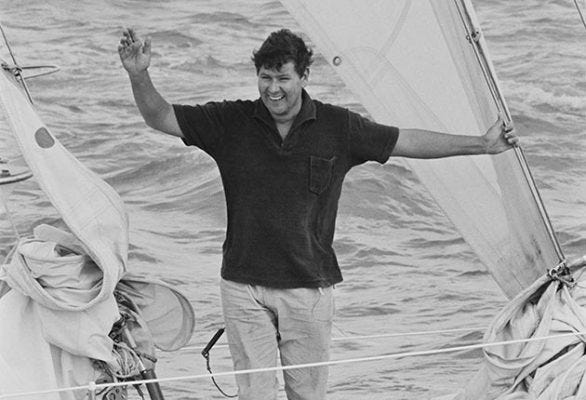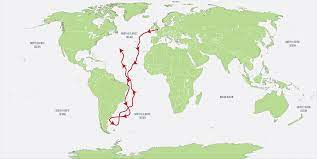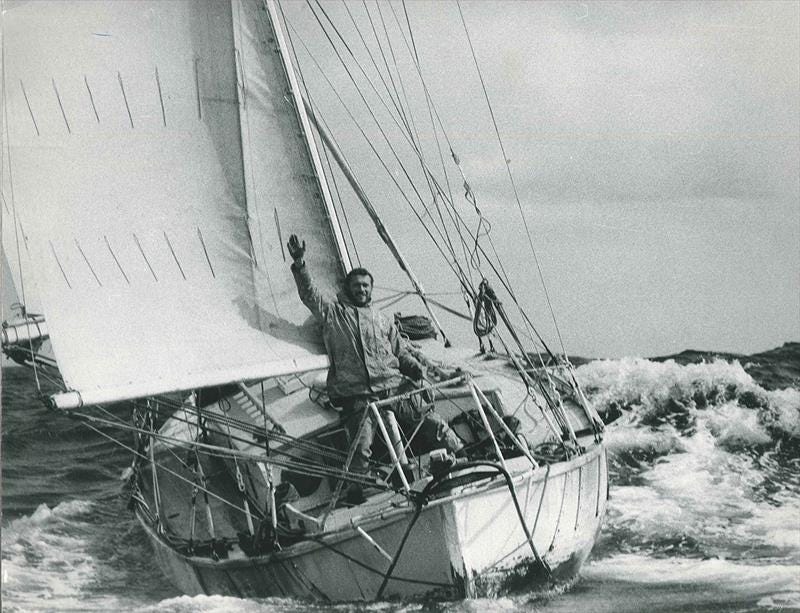Nine men started the first solo, non-stop sailing race around the world. Only one finished.
First, how did this challenge come to be?
1968, 55 years ago, NASA was preparing for a moon landing, and many considered a solo non-stop sailing voyage an even more impossible task.
The summer of 1968, three people were preparing to take on the challenge.
The voyages were often funded by newspapers that could have exclusive coverage of their attempts.
The British Sunday Times didn’t want to sponsor any specific sailor because they were concerned about sponsoring someone who might not complete the race.
In a genius marketing decision, they decided they would create the idea of it being a race and put a £5,000 reward for the fastest competitor.
Of the nine competitors, five of them ended their voyages with sickness, mental breakdowns and shipwrecks.
Let’s look at the stories of the other four and lessons I learned from them:
Chay Blyth
He entered the race with past accomplishments in the military and had completed extreme rowing challenges but had no real sailing experience.
Author Peter Nichols even said: "Few people leaving a dock for an afternoon sail in a dinghy have cast off with less experience than Chay Blyth had when he set sail alone around the world."
I like to imagine Chay sitting in a pub across from his buddies and him accepting the challenge on a dare.
I know that’s not how it happened, but when reading about this, I couldn’t help but be inspired by someone who would take on such a challenge with confidence despite his lack of experience.
Early in his race his boat began to deteriorate and he accepted help in repairing it which ended his eligibility in the race.
He decided to continue on to test himself and he ended up sailing the entire Atlantic Ocean and around South Africa in a boat that was not at all suitable to continue.
He would go on to continue to develop this new skill of sailing and he actually became the first person to sail the world in the opposite direction in 1971.
He developed a lifetime love of sailing.
Lesson Learned – Experience is important, but you have to get off the sidelines and try something new to find a passion.
Donald Crowhurst –
Crowhurst entered the race under the immense pressure of a failing business and was seeking heroism through the completion of this race.
His desperation led him to enter the race on the last day of eligibility.
He encountered immediate problems with his boat, his equipment, and his lack of open ocean sailing skills. In the first few weeks he was making less than half of his planned speed.
He was faced with a tough decision – return home to financial ruin and humiliation or continue on to an almost certain death in a boat that was not seaworthy.
He decided instead to begin his deception.
He shut off his radio and began falsifying his logbooks. He was pretending to continue the race while simply sailing in circles in calm Atlantic waters.
He planned on staying idle and coming in last place so his logbooks would not receive any critique when he got back to London.
As more racers dropped out of the race he realized his deception would surely be found out. His months of isolation fed his mind that the only escape was to leave his boat and commit suicide out at sea. He wrote in his journal:
"There is only one perfect beauty in the world - this is the beauty of truth." –
Lesson Learned – When faced with extreme personal challenge, self-reliance and isolation only exacerbate the difficult experience.
Bernard Moitessier –
Bernard began the race without even knowing he was participating.
He began conversations with sailing friends about completing the unassisted solo round the world trip long before a race was ever announced.
In August of 1968 he set off and survived being knocked flat by breaking waves and even bending the bow of his ship.
Once he had completed the most difficult parts of the voyage, he realized he'd likely win. He knew his identity would be linked to winning, and not sailing for the sake of sailing.
That was not what he set out for in the beginning.
He resigned from the race by launching a note from a slingshot to a passing ship, his reason was - "because I am happy at sea and perhaps to save my soul"
He turned his ship around and sailed for a few more months to Tahiti.
There he built a house on the beach, grew his own food, married a local, and spent the next 25 years living happily.
Lesson Learned – Ask myself - Am I competing in races of my design or would be better to opt out and follow priorities aligned with my values?
Robin Knox-Johnston –
He won the race. He persevered challenges that would have knocked out most anyone.
In a storm he lost all of his fresh water and survived on cans of beer and rain water for months.
As his boat began taking on water, he swam underneath it and by holding one breath at a time he tacked on a strip of copper to repair the leak.
His radio stopped working for two months and he had to press onward unable to communicate and knowing nothing of the other competitors’ positions.
When he was asked about the most difficult parts of the experience, he said he missed the ability to have meaningful discussions and he took to learning poetry to keep his mind active.
It took him 312 days to complete challenge and once finished he donated his £5,000 winnings to Donald Crowhurst's widow, and children.
Lesson Learned - The lesson that is apparent is the significance of grit and determination, while the lesson that is less obvious but equally crucial is the necessity of maintaining your mental well-being by consistently pushing yourself to learn. Never let your mind become stagnant.
Just like when Roger Banister broke the four minute mile Robin Knox-Johnson showed the world what was possible. Over the last 55 years many have succeeded at this challenge with the current fastest time down to just 42 days. The sailors that have completed this challenge understood the challenge was possible, and I also believe they learned some of the same lessons that I did when looking at the original nine racers of 1968.
Creator Spotlight:
Morgan Housel - Author of Psychology of Money. I read everything he writes at the Collaborative Fund. He does an excellent job of pulling from history and his own stories to make the lessons he has learned memorable for others.
I first heard about the 1968 Golden Globe Race through his new podcast.







Thanks for sharing Jordan. I too follow Morgan Housel and very much enjoyed reading his book.